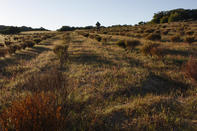Rooibos (Aspalathus linearis) is a shrubby legume indigenous to the mountains of the Western Cape and endemic to South Africa. It grows up to 1,5 m in height and has multiple thin branches with bright green, needle-like leaves.

The leaves (branches are cut 50 cm from the ground) are harvested and undergo the traditional process of fermentation which includes bruising and wetting the leaves with water and allowing it to ferment for 12 hours.
Enzymatic oxidation takes place and the leaves change from green to brown. Finally, the rooibos is spread out in the sun to dry. Green rooibos (unfermented) is harvested, cut and then dried immediately without fermentation, resulting in a tea with a lighter colour than traditional rooibos.
The plant adapts well to dryland conditions and prefers sandy soil with good drainage and pH of 4,5 to 5,5. Seeds are planted on seedbeds or plants may be propagated by cuttings. Leafhopper is a major pest as well as horsetail, a weed that grows alongside rooibos. This must be removed by hand or mechanically.
Health Benefits of Rooibos Tea
The caffeine-free tea reputed to have medicinal properties including lowering the incidence of cancer. It is safe to use on babies and is used to treat stomach cramps, skin irritation and nappy rash.
The polyphenols (organic chemicals with antioxidant properties) in rooibos have anti-inflammatory, antiviral and anti-mutagenic (prevents mutation) properties and can protect the body from free radicals which can cause cancer and heart disease.
Rooibos is a good source of antioxidants and is the only known source of a potent antioxidant called aspalathin, which may assist in treating diabetes by balancing blood sugar levels and improving the absorption of glucose.
Rooibos tea can help lowering blood pressure, acts as a bronchodilator to relieve respiratory problems and helps with the formation of HDL cholesterol (good cholesterol). Rooibos contains hydroxy acid and zinc (Zn) which can aid skin conditions like acne and eczema and can soothe sunburn.
The antioxidants in rooibos slow down the ageing process by neutralising free radicals that damage skin while high levels of manganese (Mn) and calcium (Ca) can help build and repair bones. Rooibos is available as teas, aromatic compounds and extracts (soluble in hot or cold water) with applications that range from use in iced teas, as flavouring and in cosmetics.